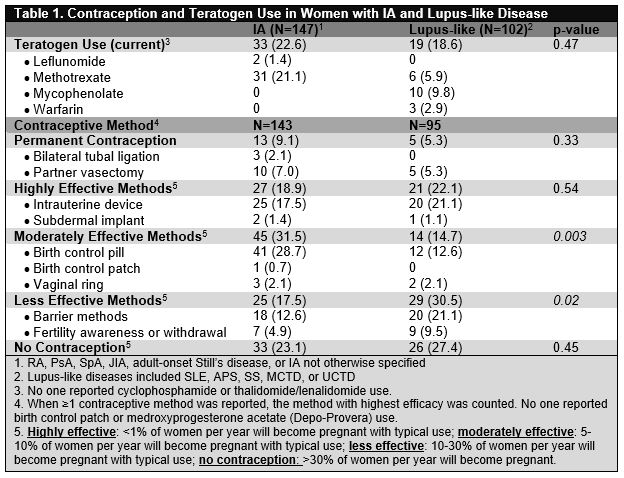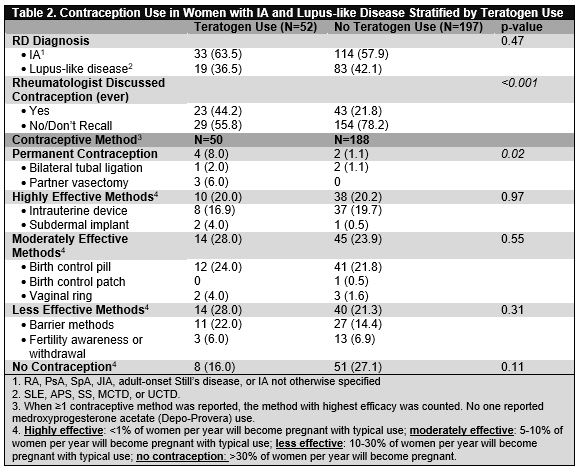Session Information
Date: Sunday, November 12, 2023
Title: (0460–0479) Reproductive Issues in Rheumatic Disorders Poster I
Session Type: Poster Session A
Session Time: 9:00AM-11:00AM
Background/Purpose: Individuals with systemic rheumatic disease (SRD) underutilize effective contraception even when prescribed teratogenic medications. As disease-related factors may impact contraception choice, we evaluated the association between contraception use and both SRD diagnosis and teratogenic medication use in patients with inflammatory arthritis (IA) or lupus-like diseases.
Methods: Women aged 18-65 years seen by a rheumatologist at our academic center ≥2 times from 2020-2022 were enrolled in a Reproductive Health and Wellness Cohort. This analysis included participants with self-reported IA or lupus-like disease. We excluded participants >50 years of age and those who self-reported menopause/premature ovarian failure, hysterectomy and/or oophorectomy, and/or infertility. We used descriptive statistics to evaluate demographics, medications, and contraception use, stratified by disease and teratogenic medication use.
Results: Of 812 cohort participants, 658 (81.0%) responded to contraception questions; 249 with reproductive capacity (mean age 36.3 ± 7.5 years, 99.2% self-reporting woman as gender identity) who self-reported IA (n=147) or lupus-like disease (n=102) were included in this analysis. Patients with IA vs. lupus-like disease were more frequently White (82.5% vs. 69.7%, p=0.04) and less frequently Hispanic/Latinx (7.5% vs. 15.7%, p=0.04). 94.8% had private insurance and 61.5% were married/partnered, with no differences between groups.
Compared to individuals with IA, those with lupus-like diseases less frequently used the birth control pill, patch, or vaginal ring (14.7% vs. 31.5%, p=0.003) and more frequently used barrier methods, fertility awareness or withdrawal (30.5% vs. 17.5%, p=0.02); groups did not differ in terms of permanent contraception, intrauterine device, or subdermal implant use [Table 1].
Compared to participants not taking teratogenic medication (n=197), those who were (n=52) more frequently reported that their rheumatologist had ever discussed contraception (44.2% vs. 21.8%, p=0.001) and more frequently reported permanent contraception use (8.0% vs. 1.1%, p=0.02). Of those taking teratogenic medication, 44.0% reported use of barrier methods, fertility awareness/withdrawal, or no contraception; frequency of any reversible method or no contraception use did not differ based on teratogen use [Table 2].
Conclusion: Among individuals with IA or lupus-like diseases and reproductive capacity seen in an academic rheumatology center, less than half used moderately/highly effective contraception. Although patients taking vs. not taking teratogenic medication were more likely to have discussed contraception with their rheumatologist, they were no more likely to use effective contraception; nearly half used less effective or no contraception. Compared to patients with IA, those with lupus-like diseases less commonly used estrogen-containing methods and more commonly used less effective contraception. Our findings can inform interventions to optimize contraception utilization in patients with SRD by targeting patients prescribed teratogenic medications and those with lupus-like diseases without contraindications to estrogen-based methods.
To cite this abstract in AMA style:
Siegel C, Barbhaiya M, Masto L, Smole A, Stamm B, Levine J, Lieber S, Mandl L, Lockshin M, Sammaritano L. Contraception Choices in Individuals with Inflammatory Arthritis and Lupus-like Disease Differ Based on Diagnosis and Teratogen Use [abstract]. Arthritis Rheumatol. 2023; 75 (suppl 9). https://acrabstracts.org/abstract/contraception-choices-in-individuals-with-inflammatory-arthritis-and-lupus-like-disease-differ-based-on-diagnosis-and-teratogen-use/. Accessed .« Back to ACR Convergence 2023
ACR Meeting Abstracts - https://acrabstracts.org/abstract/contraception-choices-in-individuals-with-inflammatory-arthritis-and-lupus-like-disease-differ-based-on-diagnosis-and-teratogen-use/


